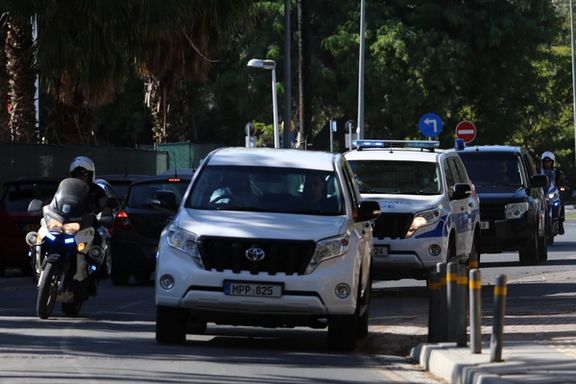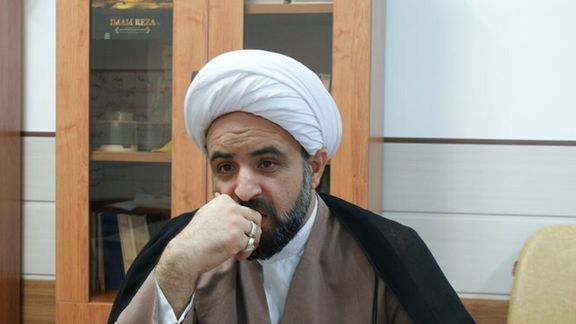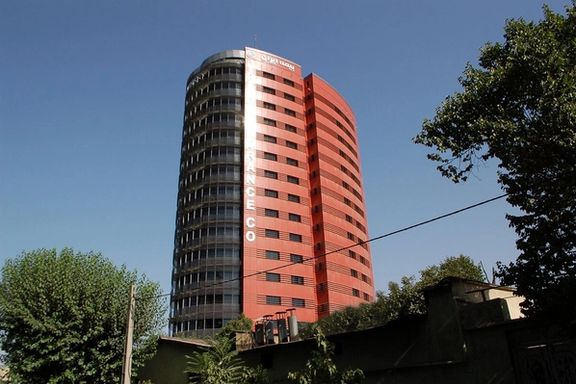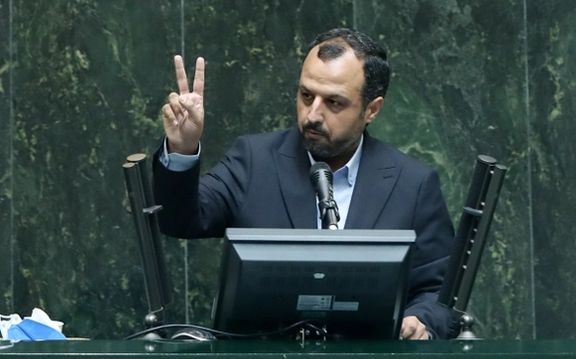Two Iranians Questioned Over Plots To Attack Israelis In Cyprus

Two Iranians have been detained in Cyprus for questioning over suspected planning of attacks on Israeli citizens living in Cyprus, a Cypriot newspaper reported on Sunday.

Two Iranians have been detained in Cyprus for questioning over suspected planning of attacks on Israeli citizens living in Cyprus, a Cypriot newspaper reported on Sunday.

Iran and Saudi Arabia will start formal talks next week to resume direct scheduled flights between Tehran and Riyadh and other cities, an Iranian official said.
"There are no restrictions regarding the launch of direct flights from Tehran to Riyadh, or other cities," Deputy Minister of Roads and Urban Development Mohammad Mohammadibakhsh told the state-affiliated news agency ILNA on Sunday.
Regular flights would be another step towards restoring ties between the two Middle Eastern rivals. A Chinese-mediated agreement in March restored diplomatic relations after years of tension that threatened the security of the entire region and fueled conflicts in Iraq, Syria and Yemen.
"A bilateral working group will start final negotiations next week to have non-haj flights between the two countries," he said, referring to the annual Muslim pilgrimage to the holy city of Mecca in Saudi Arabia.
There have been no regular direct flights between the two countries for years. Currently, only occasional direct flights take off from Iran carrying haj pilgrims.
Mohammadibakhsh said a resumption of flights would include travel for pilgrims of the year-round Umrah -- which can be undertaken at any time year -- and also non-religious travel.
Iran had already presented a list of airline companies which might operate flights, he said, but did not specify any.
Shiite-dominated Iran and Sunni Persian Gulf monarchy Saudi Arabia cut ties in 2016 over Saudi Arabia's execution of a Shiite Muslim cleric and the subsequent storming of Riyadh's embassy in Tehran.

Controversy has erupted in Iran after hardliners demanded specifically designed gowns conforming to hijab rules to be made compulsory in hospitals and operating rooms.
Twelve versions of Islamic surgical gowns have been designed for female patients in the operating room to comply with Sharia rules, announced Mohammad-Hossein Taheri-Akerdi, the secretary of a state body responsible for promotion of Islamic standards, whose main concern has always been promotion of hijab.
Taheri-Akerdi said Tuesday that the standard clothing currently worn by patients in hospitals violates women’s “dignity” and responsible government bodies have been instructed to identify the standards of religiously required and forbidden aspects in respect to “hijab and chastity” in hospital environments.
The entity that Taheri-Akerdi represents is a state-funded organization with a budget of 1.25 trillion rials (around $2.5m) in the current fiscal year, with an increase of 125 percent compared to the previous year. An even higher budget is expected to be allocated to the organization for the next year.
Not only those who oppose the compulsory hijab, but also many religious people are against the various measures that religious fundamentalists are employing to enforce the hijab rules.

“One feels like standing in front of a hidden camera and waiting for someone to say that this [situation] is just a joke, but no, these are Taheri-Akerdi’s exact words,” a commentary by Mostafa Danandeh a regular contributor to the conservative Asr-e Iran news website said.
“I don't know how upsetting the reading of these news must be for patients and their families who are dealing with the problems of finding their medication, hospital admission and its costs these days. They see that there are people in this country who are looking for Islamic surgical clothes instead of worrying about availability of medicine and the conditions of hospitals,” he wrote.
He added that he thinks the entity that seriously needs reform is the same organization that needlessly tries to impose obscure religious standards and trying to anger people with its decisions.
Some clerics and Islamic scholars such as Ayatollah Seyed Mohammad-Ali Ayazi, a member of a reformist clerical association in Qom, have also criticized the demand for Islamification of hospital gowns.
In an interview with Salamat News (Health News) Thursday, Ayazi criticized fundamentalists and said from the religious point of view demanding Islamic hospital gowns to be designed is a matter of minimal importance when both doctors and patients must deal with such serious problems as shortages of medicine and equipment.
Some media and social media users have pointed out that there may be a hidden agenda in the official’s declaration about unsuitability of current hospital gowns and need for designing Islamic ones.
“But the point that has not been paid much attention to is this story’s economic aspect like the open and hidden financial dimensions of government measures in regard to hijab clothing … and in whose pockets the profits find their way?” a commentary in Faraz Daily, a news website, wrote Saturday.
Faraz Daily mentioned in its article that there are no official data on the market turnover of hijab clothing such as fabric for making the long black veils, called chador in Persian, that is largely imported.
The article also pointed out that the secretary of the Cultural Council said in September 2022 that the black veil was “an essential commodity” and said the government must encourage importing fabrics for the veils by lowering import tariffs. In addition, when a commodity is listed as essential, importers can receive foreign currency from the government at preferential lower rates. This practice has been a major source of corruption in recent years.
A black veil made with imported fabric can cost as high as 20m rials ($400), with the cheapest ones made with domestically produced fabric costing around one-third of that.

The French Navy's Languedoc frigate intercepted two drones launched from the Houthi-controlled territories in Yemen, following a threat by the Iran-backed group to attack ships destined for Israel.
As confirmed by the General Staff of the French Armed Forces on Saturday night, the interception occurred approximately 110 km off the coast of Hudaydah, a port city under Houthi control and supported by Iran.
The Languedoc, stationed in the Indian Ocean Maritime Zone since August, recently played a crucial role in escorting the US Navy's USS Dwight D. Eisenhower aircraft carrier through the strategically vital Strait of Hormuz into the Persian Gulf.
The drone launch follows increased tensions in the region, with Yemen's Houthis carrying out multiple drone and missile attacks against US and Israeli targets since Hamas's offensive on Israel in October. The Houthi attacks come in response to Iran's leader Ali Khamenei's call to ban the shipment of oil and food to Israel. While Iran has not directly participated in the Israel-Hamas war, it has utilized proxy groups like the Houthis and Hezbollah to target Israel and American interests.
On Saturday, Yahya Saree, the spokesperson for the Houthi's military forces, issued a warning, threatening to attack any ship approaching Israel, regardless of its nationality. Saree urged all ships and companies to avoid dealing with Israeli ports for the safety of maritime navigation.
Recent weeks have witnessed an escalation in Houthi attacks on civilian and military vessels in the Red Sea and Gulf of Aden, including the firing of ballistic missiles toward Eilat, intercepted by the Israeli Defense Forces (IDF). The US Navy also reported successfully intercepting a drone from a Houthi-controlled area in Yemen.

The trial of Johan Floderus, a Swedish national employed by the European Union, has commenced in Tehran, as confirmed by Sweden's Foreign Minister Tobias Billstrom on Saturday.
Floderus, detained in April 2022 during a vacation in Iran on charges of espionage, is now navigating a legal process marked by little transparency.
Foreign Minister Billstrom informed the Swedish news agency TT, stating, "I have been informed that the trial of Johan Floderus has begun in Tehran." Notably, the Swedish charge d'affaires was denied participation in the trial, prompting Sweden to seek permission for future involvement in the proceedings.
The specific charges against Floderus remain undisclosed, but his family asserts that the detention lacks justifiable cause or due process. The situation amplifies concerns voiced by rights groups and Western governments, accusing Iran of exploiting arrests on security charges for political ends. Tehran, however, maintains that such detentions adhere to its criminal code and are devoid of political motivations.
Diplomatic tensions between Sweden and Iran have heightened since 2019, following Sweden's arrest of former Iranian official Hamid Nouri, involved in the mass execution and torture of political prisoners in the 1980s. Nouri was sentenced to life imprisonment last year, leading Iran to recall its envoy to Sweden in protest.
In a related incident, in May, Iran executed a Swedish-Iranian dissident accused of leading an Arab separatist group, implicated in various attacks, including a 2018 military parade incident resulting in 25 fatalities.

The first-ever national Iranian state-controlled insurance company has faced a significant loss of net profits in 2022, a decrease of 300% from the previous year.
Established in 1935, the company with offices around the world, including in the UK, has suffered substantial losses over the past few years, under the management of political appointees.
The government-owned Iran Insurance Company held a market share of nearly 50% back in 2014 which is now estimated to be 27%.
The company's accumulated losses since 2021 have increased by more than 4 trillion rials (nearly $95 million), in addition to accumulated debts.
Aftabnews in Tehran has reported that the downward spiral of the organization has accelerated much more rapidly during the past two years, which could point to the beginning of Ebrahim Raisi's presidency, who appointed his political allies to run the company.
A series of promises were made to justify the changes when Ehsan Khandouzi, Minister of Economic Affairs and Finance, reshuffled key players in the company. In the industry, these moves caused outrage and backfired.

In light of recent scandals such as the $3.5 billion embezzlement case of Debsh Tea Company and the missing $336 million of Tehran Municipality's collected revenues, it is not unthinkable to ascribe losses at Iran Insurance company to mismanagement and even possible corruption.
In January 2022, Raisi's Economy Minister appointed Hassan Sharifi as CEO after removing Majid Bakhtiari from this position. Various Iranian media outlets described Sharifi as a “security agent” with experience working for the Iran Insurance Company.
Aftabnews reported in April that the appointment was made in what appeared to be a “political agreement behind the scenes”. In just a few months the weaknesses of the new management team fueled infighting and disunity in the company.
A second change involved the removal of Dariush Mohammadi and the election of Alireza Moghadesi as a member of the Iran Insurance Board of Directors in December 2022. Previously, Moghadasi was the head of the Islamic Republic of Iran Customs Administration (IRICA). It is not clear why Mohammadi was removed from this position.
Bimeyedigital, a website covering insurance news in Iran, characterized Moghadasi's appointment as "controversial" and wrote the following in December 2022, "Ehsan Khandozi has sent a clear message to the insurance industry by this appointment: There will be no room for meritocrats and elitists, but only a select few will be allowed to operate based upon criteria established by the Minister of Economy.
Another publication also criticized the move and wrote: Mohammadi should be regarded as the most qualified former member of Iran's insurance board who has given his place to the least qualified person in the industry, with no experience in the area of insurance.
The latest change took place in September and involved the Director-General of the Central Insurance Company of Iran (CIC). A regulatory body for the Iranian insurance industry.
The Economy Minister dismissed Majid Behzadpour, the head of Iran’s Central Insurance Company after nearly 20 insurance companies were targeted by hackers. The government denied this claim, but it sparked another set of changes, and some have even contended that the hacking was a pretext to legitimize changing management.
The Paydari ultraconservative party, enjoying a majority in parliament, also has unparalleled influence in presidential administration and controls most of the appointments to government-controlled companies. Numerous government corruption cases in the past two decades have shown that state companies are a lucrative target for regime insiders in Iran.
The two individuals were believed to be in the early stages of gathering intelligence on potential Israeli targets, the Kathimerini Cyprus newspaper said without citing sources.
The paper added that the Iranians were political refugees in contact with a person linked to the Iranian Revolutionary Guard.
A senior Cyprus official declined to comment, citing policy on issues concerning national security.
Barely a 40-minute flight from Israel, Cyprus is a popular holiday and investment destination for thousands of Israelis.
Also on Sunday, Israeli Prime Minister Benjamin Netanyahu said the Israeli intelligence service Mossad helped Cyprus foil an Iranian-ordered attack against Israelis and Jews on the island, saying such plots were on the rise since the Gaza war erupted.
Israel is "troubled" by what it sees as Iranian use of Turkish-controlled northern Cyprus "both for terrorism objectives and as an operational and transit area," the statement added.
Netanyahu also said in June that an Iranian attack against Israeli targets in Cyprus had been thwarted. Iran has been implicated in many assassinations, kidnappings and terror attacks abroad against dissidents and opponents.
In the past, Israel and Cyprus have worked together to foil Iranian attacks on Israelis. Two years ago, an Azeri national with a Russian passport, who was acting on behalf of the Iranian Revolutionary Guards, was arrested by Cypriot intelligence services. The hitman was hired to kill an Israeli businessman.
Earlier this year, the IRGC accused Israel of assassinating its military adviser Milad Haydari with an airstrike in Syria, vowing to retaliate.
(With reporting by Reuters)